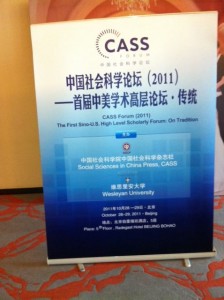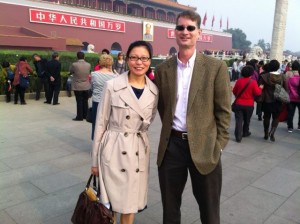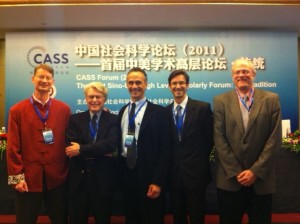In the week of Fall Break (before the storm and the power outage), I was in Berkeley and then Beijing giving lectures and attending a colloquium. At the University of California at Berkeley, I spoke to a group interested in the intersection of arts and humanities research with liberal learning, and with another research group focused on critical theory. Here are the video links through UC Berkeley:
http://www.youtube.com/user/UCBerkeleyEvents#p/u/8/JjR4yFYzmQY
http://www.youtube.com/user/UCBerkeleyEvents#p/u/10/YsUmCqQ_jQk
The scholarly meeting in Beijing was jointly organized by the Chinese Academy of Social Science and Wesleyan, with special leadership from our journal in the philosophy of history, History and Theory.
The theme of our discussions was “tradition,” and the meeting was structured around twenty essays, half written originally in English and half in Chinese. Translators did yeoman’s service in preparing the written materials in advance and in providing simultaneous translations throughout our discussions. Here in this photo is our great translator Guofei with philosophy professor Stephen Angle:
I was very interested to learn that the question of traditional culture has become an important topic for Chinese humanists and social scientists. People start talking about tradition when it is being put under pressure, and the extraordinarily rapid economic growth and social changes in China have led many in the scholarly and political worlds to reflect on what is being lost during the recent push towards modernization. There was much discussion by our Chinese colleagues of the resources available to the present from the long history of Confucianism, now coupled with varieties of what they referred to as dialectical thinking. Our host, Prof Gao, gave a fascinating presentation on how during the Ming dynasty there was a current of liberalization that took classical traditions as its enemy. Today, though, this current is itself a tradition that can be reactivated.
We discussed, thanks to Debra Satz (a philosopher from Stanford), how market forces often undermine traditions even as they depend on them to work properly. Wesleyan faculty Steve Angle, Joe Rouse, Ethan Kleinberg and Phil Pomper all contributed essays that examined historical and philosophical aspects of the topic — from neo-Confucianism to Russian state power, from science to critical theory. We missed having Vera Schwartz with us, though she provided invaluable planning advice.
In conversation with our Chinese colleagues, we all learned about specific issues in intellectual history, and I certainly became more alert to how our usual frames of reference are very much situated in a particular American context. And you can see from the photo that our Wes context as represented in China was too male.
My presentation at the meeting dealt with what I called “the tradition of anti-tradition in American views of education.” I focused on views that linked education and freedom, and on the Emersonian notion of self-reliance. I was surprised and delighted when Prof. Gao quoted Emerson in his concluding remarks at the conference. I also lectured about liberal arts education at Beijing Normal University. The group of faculty and grad students there were especially interested in breaking away from narrow, vocational forms of higher education. I learned so much from their thoughtful questions and concerns. Here are some links to news reports in China about the meeting:
1. Xinhua,
http://news.xinhuanet.com/photo/2011-10/28/c_122211192_4.htm
2. China Daily
http://www.chinadaily.com.cn/zgrbjx/2011-10/28/content_13998853.htm
3. Netnews
http://news.163.com/11/1028/21/7HFVVLLN00014JB5.html
4. Hexun news
http://news.hexun.com/2011-10-28/134675182.html
5. China Academy of Social Science (notes)
http://www.cssn.cn/news/422865.htm
6. 21CN
http://news.21cn.com/caiji/roll1/2011/10/28/9601196.shtml
The China social science press billed this the first high-level Sino-American Research Exchange. We plan to have the next meeting in Middletown, probably in 2013. The theme, Unfinished Enlightenment, will build on the work we did for this meeting, and I am confident it will make the Middletown-Beijing axis a powerful one in the humanities and social sciences.






nice to see my name finally in print !!!
“CASS ” was my nickname at Wes class ’57